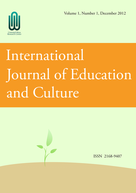


Volume 13 Issues 3-4 (2024-12-31)
Volume 13 Issues 1-2 (2024-06-30)
Volume 12 Issues 3-4 (2023-12-31)
Volume 12 Issues 1-2 (2023-06-30)
Volume 10 Issues 1&2 (2021-06-30)
Volume 9 Issues 3&4 (2020-12-31)
Volume 9 Issues 1&2 (2020-06-30)
Volume 8 Issues 3&4 (2019-12-31)
Volume 8 Issues 1&2 (2019-06-30)
Volume 7 Issues 3&4 (2018-12-31)
Volume 7 Issues 1&2 (2018-06-30)
Volume 6 Issues 3&4 (2017-12-31)
Volume 6 Issues 1&2 (2017-06-30)
Volume 5 Issues 3&4 (2016-12-31)
Volume 5 Issues 1&2 (2016-06-30)
Volume 4 Issues 3&4 (2015-12-31)
The purpose of this quantitative study was to examine student’s perspectives and determine the teaching characteristics of Medical Radiation Sciences (MRS) professors that are perceived as most important to students enrolled in the Medical Radiation Sciences program at two Canadian higher education institutions. An electronic survey was released to 459 undergraduate students enrolled in the Medical Radiation Sciences program. Data were analyzed for differences based on the student’s year of study and specialization. Results showed that MRS general knowledge and professional competence and teaching practices in the classroom were the teaching categories which were considered “very important” to students. Although the results showed no drastic difference between the rated importance of each characteristic there were distinguishable differences relative to specific groups of students. Important educational implications are discussed.
The central goal of this study was to explore the influence of the African Caribbean students’ home life on their chemistry achievement. The study utilizes a mixed-methods approach and two research designs. A quantitative correlational design (using spearman rho correlational analysis), and a phenomenological qualitative design were used. For the quantitative part of the study, a questionnaire was given to 18 Baltimore high school students. Chemistry test scores were also collected. The results revealed that the students’ home factors associated with parental involvement and parental encouragement/influences were all significantly correlated to the students’ chemistry success and these factors were also best predictors of these students’ achievement. For the qualitative part of the study, seven parents were interviewed. The interview data were coded and common themes identified. Qualitative and quantitative data suggested that “parental involvement factors” significantly influenced Caribbean students’ academic success. The findings of this study also revealed that first-generation (22% in this study) and second-generation African Caribbean immigrant students (78% in this study) are doing well academically. Important implications are discussed.
The identity of the teacher has been determined to influence classroom practices. Positional identity is defined as one’s perception of oneself relative to others. This qualitative research study investigates the positional identity of five high school science teachers of different ethnicities and how their positional identities influence their classroom practices. Positional identity is thought to be determined by one’s perception of how one’s race, ethnicity, gender, age, religion and socioeconomic status position one relative to others. The methods of data collection included classroom observations, structured and semi-structured interviews, book club meetings, teacher journals, and researcher journals, demographic and online questionnaires. The teachers that overcame stereotypes based on race/ethnicity, gender and socioeconomic statuses felt empowered and were able to empower their students while others were not able to merge their positional and personal identities.
At the onset of their doctoral studies, Niagara University students in a Leadership and Policy Ph.D. program created digital portfolios utilizing their choice of technological medium, which showcase their personal and professional accomplishments. Students continuously update their portfolios throughout the Ph.D. program; the cohort group of this study (Fall 2011) is demographically diverse and consists of digital natives, immigrants, and visitors. The purposes of this digital portfolio assignment are to facilitate doctoral student awareness and appreciation of the interests and values of cohort members, and to provide a process and framework to record significant student and/or cohort experiences, references, and documents.